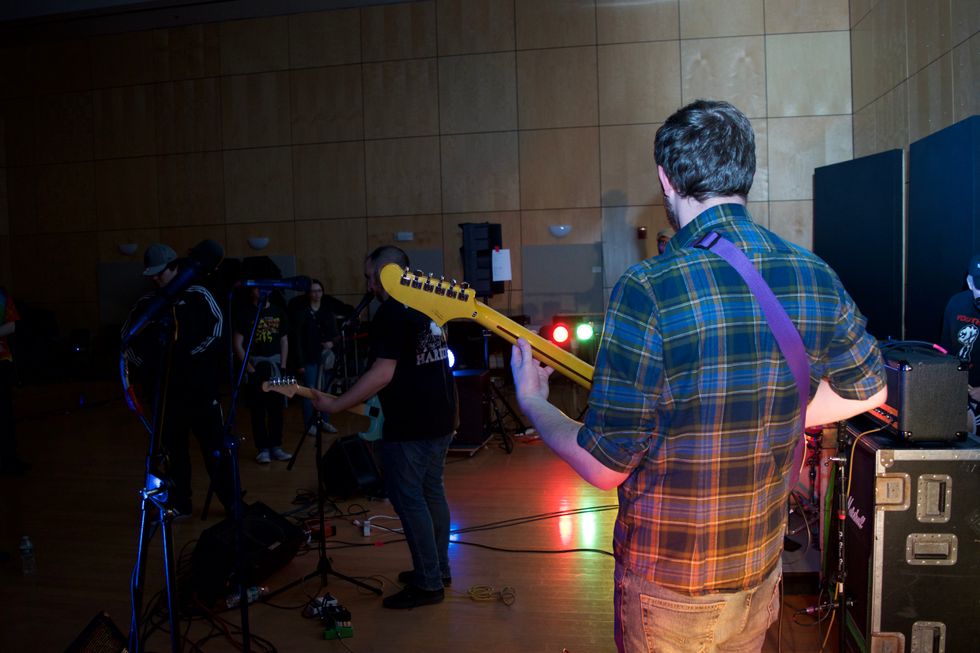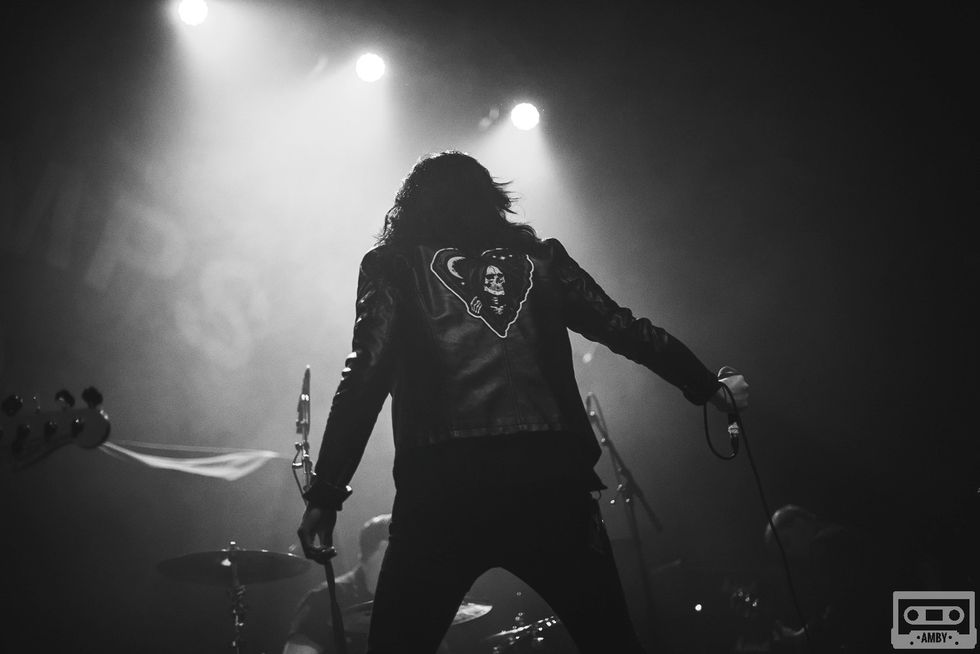Many of us when we start our first garage bands have stars in our eyes and expect the masses to come to us when we put our obscure EP on Bandcamp. Unfortunately, in the experience of those I have met and my own, this is no way to become successful in an industry that is more overpopulated and bloated than it ever has been. If you keep these tips in mind when trying to break you band, you'll be more than a leg up on your peers.
Don't be That Guy!
It is hard enough to break out as a band nowadays and it becomes impossible when you aggravate all of your peers. This is not the Rock n' Roll era of thirty years ago where bands competed to become bigger than their rival hometown garage band. Rivalries don't sell tickets or pack out venues anymore. Becoming friendly with your other local bands is your best bet for not only getting more shows, but your only hope of getting over the hump of getting a local following (which quite honestly is one of the hardest parts about starting a band).
Take Every Show You Can Get!
I don't care if you have 1000 Facebook likes or none - you need exposure and you need to prove to people that you are a talented band worth watching and not just a bunch of random people good with Pro Tools. You can put your "fantastic EP" on Bandcamp or Soundcloud all you want - but you'll never get a following if you don't play those songs live and show your town that your band and your music is worth the buy-in. And don't be too proud to play house, basement, or living room shows - 99% of the time those are the only shows you are going to get when you first start out. And you'll probably only play to a handful of people when you first start anyway. If you only get six people to come watch - don't let your ego get to you - go play that show. You need to be humble when you first start out.
An amazing band called Hiding Out from New Jersey playing a house show in Oneonta.
Show-Swapping and Building a Fanbase
I actually learned this next one from Mike Mowery of Outerloop Management/Records and Chris Fronzak of the metalcore band Attila. Once your band/act has built a cult following in your town (let's say you rack in about 100-200 people per show that you play) it's time to broaden your horizons a bit. Get in contact with another local band of similar style/genre in a different town near you, and use a strategy called "show swapping." What does this mean? Basically, your new friends in the other town will play a headlining show in their town and use your band as their direct support. So let's say their band draws 150 local fans from their town to every show, which means your band is exposed to 150 new listeners. And of course your band would do the same thing but have a headliner in your town with your new friends from the other town as your direct support. You keep doing this until you about double your audience at each of these shows. After that happens you repeat the process with a band from a bit farther away, let's say the next county over. And then you move on to a band from a neighboring state, and do so until you begin swapping with bands down or up the coast from you. Then your band is effectively ready for their first east coast tour! You can of course tour before then, but it would be a week-long run at most (a mini-tour). Trust me, this not as easy as it sounds and it often takes years, but it's an incredibly rewarding process.
Advertising
"With an industry this bloated, the average listener has become subconsciously lazy in finding new acts."
This next one has a bit of a stigma towards it, but it is essential if you ever hope of making money performing/recording music. Advertising your music and upcoming shows is a necessity - and by no means makes you a sell-out. There are several local bands I never would've heard about or become a fan of if they didn't reach out to me first over Facebook. Online networking/fan-building didn't die with Myspace, most of that community has moved on to Facebook, and some to Twitter. Many go as far as to "friend" or follow people who follow bigger bands similar to their sound. I had many send me direct messages saying I had an awesome taste in music and we would joke around for a bit before they sent me a YouTube to one of their newest songs and asked for my honest feedback. I'm still in contact with almost all of those band members, and those lasting relationships can be the difference between a die-hard fan and a roll of the eyes. With an industry this bloated, the average listener has become subconsciously lazy in finding new acts. Your music can be fantastic and you can have a better stage presence than Freddy Mercury - but no one will come to your shows, buy your music, or even care until you advertise and bring your band to their attention.
Branding
Having evolved from a simple stage setup or flashy outfit to the layout of a Twitter account, branding is one of the most crucial ways to make your band stand out from the pack. Like advertising, branding your band is not "selling-out" - as long as you're doing it naturally. If it doesn't fit the character of the members of the band or the style of music you're playing - don't do it. And don't paint your act as something that it's not, especially if you do it in hopes of making money, because that is actually selling out.
But branding in itself, nowadays, is used to create a sort of aesthetic for your band. Gone is the era of "character" bands that brand ad nauseam (a.k.a. KISS), and now bands don't go nearly as far. An "aesthetic" establishes the band as unique (usually includes clothing styles, how they style their social media pages, and of course stage setups and nuances of the live performance), but doesn't go as far as to make the band look like a gimmick. Branding can be simple or complex, subtle or obvious, but it most certainly something that can ruin your band if you let it get out of control.
One of my new favorite bands, Creeper, are masters at subtle branding. Their iconic reaper/heart logo is an iconic symbol for their fanbase - which they refer to and brand as their "Cult." I was sold immediately.
Social Media Presence
The music industry is incredibly bloated in 2017, and you may have fantastic music and an amazing stage presence - but if you don't stay prevalent in the minds of your fans it's incredibly hard to regain their attention. You don't need to be a social media "guru" to be a successful presence online, but you need to be active. Branding also takes a prevalent role in this as well - from your band's profile pictures/cover photos to the aesthetic of their posts and general profile. For example, some bands will only post photos on Instagram with a certain color scheme or filter, others even use certain emojis to accomplish the same thing. The most subtle things can mean the difference between a fanbase's attention and none of it.
A good social media presence also serves as a great way to keep your fans' attention when you're not touring or playing shows - such as periods when you are writing/recording or just during regular time off. Going on your social media and interacting with fans often can go a long way to staying relevant and bridging the gap between tours or record cycles. Not to mention that so many of local shows nowadays are organized over Facebook, and being active online can help build relationships with other bands as well.
The Music is Key
"As a band you need to put out consistently good music regularly if you ever hope for success."
The music industry is built upon one giant foundation - the music. It's the reason people even care about artists in the first place. Fans will stop paying attention if your music is awful - even if you have a great stage getup or aesthetically-pleasing Twitter account. As a band you need to put out consistently good music regularly if you ever hope for success. So many talented acts fail before they even begin because they're too focused on playing shows or branding to make sure the music they put out isn't awful. Your music always comes first, and if it doesn't - then your band is already finished.


















